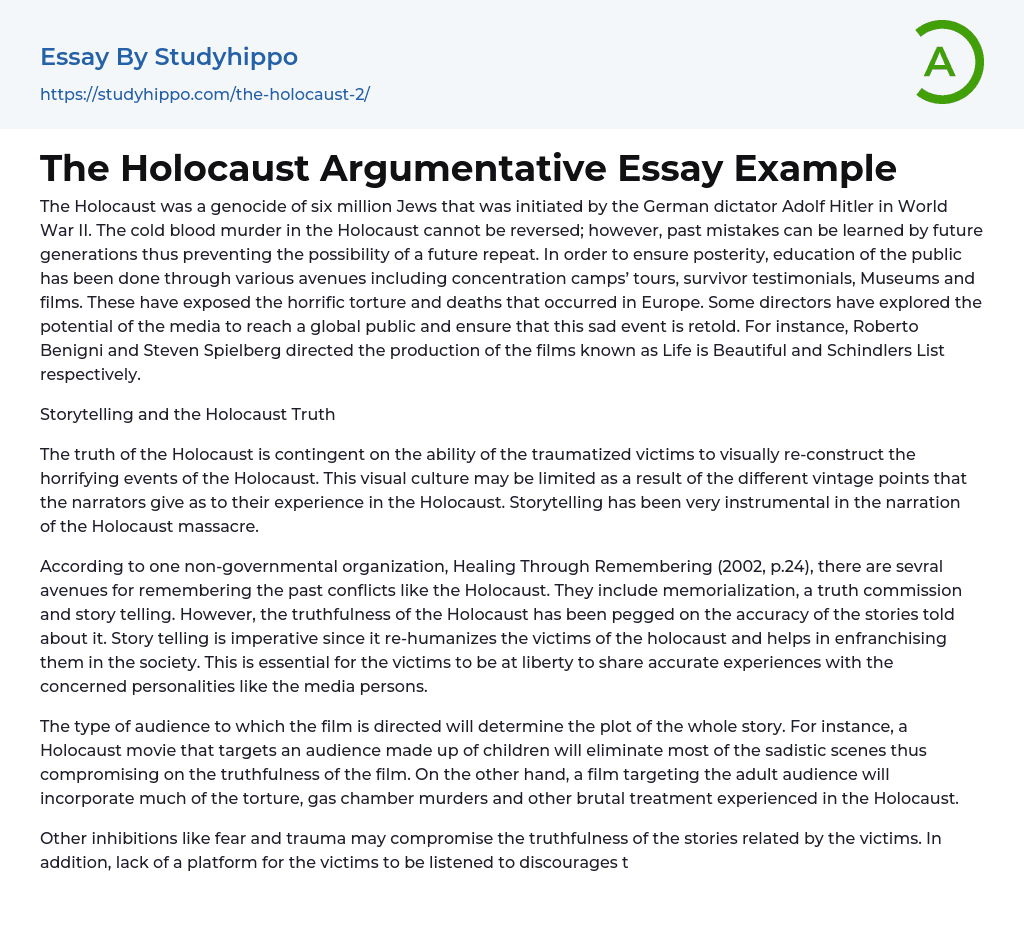Adolf Hitler, the German dictator in World War II, started the Holocaust which was a genocide of six million Jews.
The Holocaust, characterized by irreversible cold-blooded murder, can provide valuable lessons for future generations. By gaining knowledge from previous errors, we can effectively prevent any potential recurrence. To preserve the memory of this devastating event, the public has been educated through various methods including concentration camp tours, survivor testimonials, museums, and films. These mediums have revealed the unimaginable suffering and fatalities that occurred in Europe. Certain filmmakers have even utilized media to reach a global audience, guaranteeing that this tragic occurrence is eternally remembered.
For instance, the films known as Life is Beautiful and Schindlers List were directed by Roberto Benigni and Steven Spielberg, respectively.
Storytelling and the Holocaust Truth
The truth of the Holocaust depends o
...n the ability of the traumatized victims to visually reconstruct the horrific events. However, this visual culture may be limited due to different perspectives from narrators who experienced the Holocaust. Storytelling plays a crucial role in recounting the Holocaust massacre. According to Healing Through Remembering (2002, p.24), a non-governmental organization, there are various ways to remember past conflicts like the Holocaust.
Memorialization, truth commission, and story telling are all important aspects of addressing the Holocaust. The accuracy of the stories told about the Holocaust plays a crucial role in establishing its truthfulness. Story telling is necessary because it humanizes the Holocaust victims and gives them a voice in society. This enables victims to freely share their accurate experiences with individuals like the media. The intended audience of a Holocaust film determines the plot and may impact the film's truthfulness. For example, a Holocaust movi
targeting children may remove certain sadistic scenes, thus affecting the film's accuracy.
When targeting an adult audience, a film about the Holocaust will include graphic content such as torture, gas chamber murders, and other brutal treatment. However, the truthfulness of the stories told by survivors may be compromised by inhibitions like fear and trauma. Additionally, the lack of a platform for victims to be heard discourages them from sharing their experiences. According to Del Zotto (2002), victimization is a major obstacle in creating a dialogue that ensures truthfulness in recounting the bizarre events of the Holocaust. Storytelling can be either individual or collective, with the goal of transforming not only individuals but also society as a whole.
Individualizing storytelling has a negative impact because the authenticity of the story depends on the different narratives of victims who experienced the Holocaust at different times. Additionally, for the storytelling to be truly authentic, there needs to be a liberal political atmosphere that reassures victims of their safety. However, the truthfulness of the story also relies on the determination and commitment of Holocaust survivors.
Audience Participation
Some members of the audience directly participate by being cast in films to communicate the message of the Holocaust. The audience also critiques the films for their realism, judging their authenticity based on how they portray Nazi atrocities. According to Grobman, Landes, and Milton (1983, p.8), the visual impact of film footage showing Nazi atrocities raises sensitive issues for the audience.
When faced with stacks of unclothed bodies, observers must consciously address their individual perspectives on violence and horror. The distasteful immediacy of newsreel footage depicting women being forced into pits while naked by the Eisatzgruppen poses
questions that every audience member must confront.
- Anne Frank essays
- Adolf Hitler essays
- Concentration Camps essays
- Elie Wiesel essays
- Holocaust essays
- Nazi Party essays
- Weimar Republic essays
- American Civil War essays
- Atomic Bomb essays
- Attack essays
- Cold War essays
- Crimean War essays
- Diplomacy essays
- Emilio Aguinaldo essays
- Emperor essays
- Hitler essays
- Iraq War essays
- Korean War essays
- Mexican American War essays
- Nazism essays
- Nuclear Weapon essays
- Philippine Revolution essays
- Revolutionary War essays
- Rwanda essays
- The Spanish American War essays
- Trench Warfare essays
- Tribe essays
- Vietnam War essays
- War of 1812 essays
- Western Front essays
- World War I essays
- World War Ii essays
- 12 Angry Men essays
- A beautiful mind essays
- A Separation essays
- Alfred Hitchcock essays
- American Beauty essays
- American Films essays
- Animation essays
- Avatar essays
- Blade Runner essays
- Bollywood essays
- Bond essays
- Bridge essays
- Cinema Of The United States essays
- Comedies essays
- David essays
- Dead Poets Society essays
- Do The Right Thing essays
- Documentary essays




